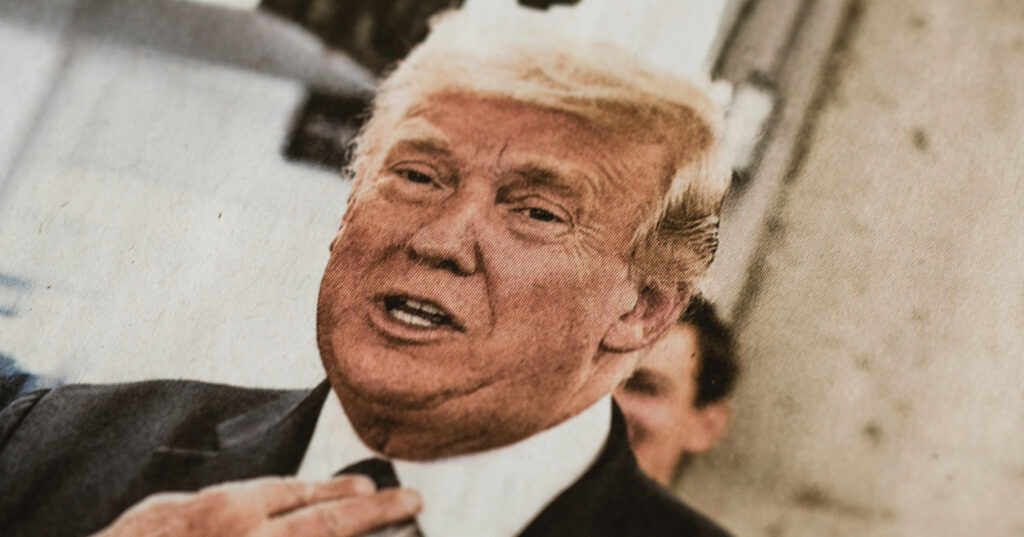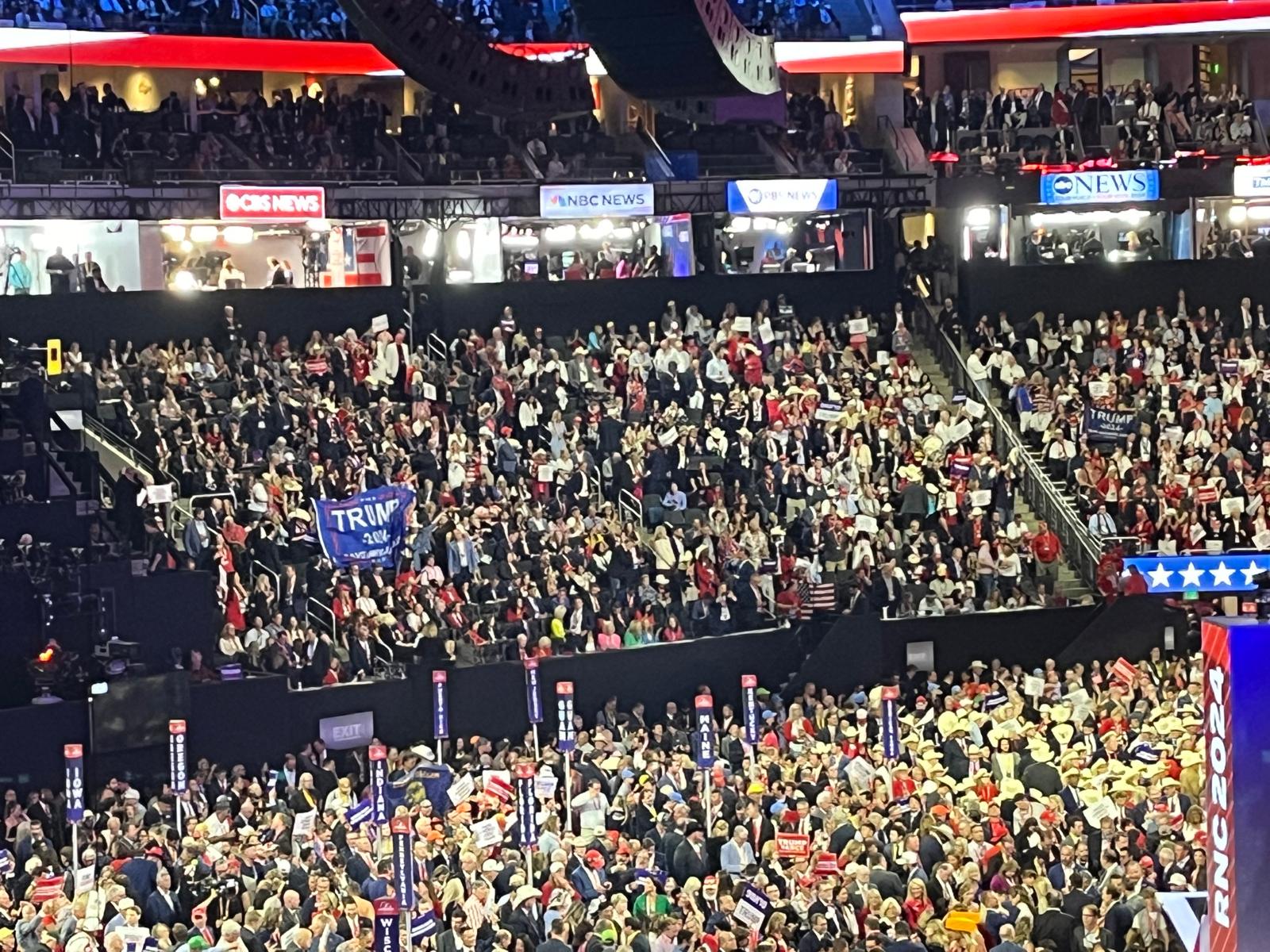
In the weeks before the United States elected Donald Trump in 2016, I conducted focus groups to find out what was on people’s minds in swing states around the country This year, the Ashcroft in America tour is happening via Zoom, but the aim is the same: to hear what voters themselves are thinking as they weigh their decision. This week we begin in Florida and Wisconsin, speaking to voters who backed Trump in 2016 having backed Obama four years earlier and were having second thoughts, Hispanic voters who had helped elect Trump but were now undecided, and centrist Democrats backing Biden with varying degrees of enthusiasm.
Our 2016 Trump voters had plenty of complaints, often to do with the way he conducts himself: “We were looking for a complete change and we certainly got that,” says one. “But he fails in my mind with acting the way a President should act;” “He’s arrogant, he’s not honest, and, you know, he’s our leader. So I just don’t feel we have anybody to look up to;” “I thought he was a good candidate versus Clinton. But I also feel like when he got into office, his ego sort of took over. All the Twitter stuff – if you’re the president of a country you don’t need to be doing that at three in the morning.”
“Who says you have to like the President?”
Were these things not plain to see when you elected him four years ago? “I thought the job would knock a few rough edges off him. I thought he would take it down a notch;” “I guess I expect the President to have some respect for the job. It’s not a reality TV show. And it’s not good enough to be able to say, well, that’s him. Now you’re the President.”
But as we saw during the last campaign and throughout his time in office, many were grudgingly prepared to tolerate Trump’s antics as the price of what they regarded as more important things: “You have to put aside some of the Twitter stuff and that type of thing. But the one thing you cannot take away from him is that he has done what he said he was going to do;” “He’s crass, rude, but standing his ground and he does believe in America;” “Being President of the United States calls for a certain level of decorum and he certainly fails on that, and that is bothersome to me. But you know, you can’t argue with the stock market;” “Who says you have to like the President? He’s an employee for us. He’s done the job, there’s no doubt about it.”
“I don’t think he believes enough in science or is intelligent enough to accept when he is wrong.”
Though they praised his record on the economy, trade, law enforcement and international relations, many previous Trump voters were more doubtful about his handling of the covid pandemic. This was not universal – even some opponents said the outcome of such an unprecedented event would probably have been similar whoever was in the White House – but some felt he had taken the wrong attitude and set the wrong tone: “I found it very disappointing, as I don’t think it was a hoax. I don’t think it’s something you drink Clorox bleach for. I don’t think he believes enough in science or is intelligent enough to accept when he is wrong;” “He’s been unwilling to back off his initial stance. I would have liked to see him acknowledge a little bit more that this maybe is a bigger thing than he originally thought.” These mistakes were not necessarily enough for wavering supporters to write him off, however: “I don’t judge the entire book on just one page”, as one put it. “People who are looking for a consoler-in-chief, that’s just not his personality.”
“He pretended it wasn’t a big deal and then went and caught it.”
But it was notable that Trump’s own experience of the virus, rather than prompting an outpouring of sympathy and concern, often produced the usually unspoken reaction that it served him right – both because of his disdain for masks and social distancing, and his wider handling of the crisis: “Look where he’s sitting today. That’s ironic. Nobody could have done anything about it but yes, as a leader, he could have done listening to science. But he totally discarded that aspect and went on with his own ingenuity;” “I hate to say I would like to see him suffer a little bit, but in all reality, he’s not handling it right. The reason he has it is because he didn’t handle the situation correctly;” “With him getting covid and his blatant disrespect for wearing masks, that’s a problem for me. More people in the White House are getting infected. Against the blatant disrespect for PPE, I don’t know, it just seems like he could have avoided that and avoided other people getting it as well;” “It was kind of a negative for me that he pretended it wasn’t a big deal and then went and caught it anyway;” “During the debate he said, oh, Biden, you could be 200 feet away and you’d wear the biggest, stupidest mask ever. He made it kind of an insult to wear a mask, and then he goes and contracts covid.”
Trump’s declaration on leaving hospital that people should not be afraid of the virus was given short shrift by many, including some of his own voters: “We all don’t have the resources that he has. How would it affect me or my husband or any of us?” “I’m a mother of eight kids, I do have something to be afraid of. If I get sick, I can’t care for my children, if my husband gets sick he can’t work. We can’t all afford these Molotov cocktails of medication that he got in hospital to make him feel better.”
“Singing Kumbaya with everybody is not going to work.”
Even with his more doubtful 2016 voters, President Trump was on much firmer ground with his handling of the Black Lives Matter protests over the summer, which many felt had strayed from their original purpose and had been allowed to get out of hand: “Those crimes committed by those police officers aren’t to be negated, but those are extreme outliers. I don’t see a need to say anything about law enforcement in general;” “A lot of people in these protests don’t even know what they’re fighting for. They’re just pissed about being locked down. People are just acting like assholes, basically;” “I feel like a lot of the rioting is staged and it’s been organised by some higher power. When you see pallets of bricks being brought in where there’s a riot happening, readily available for someone to grab a brick, who brought those bricks in? Who staged that?” “I don’t call these people protesters, they were nothing but thugs and irritants. Gangs breaking the glass of department stores and stealing the merchandise. Those are the people that need to be stopped.”
While most previous supporters backed his willingness to deploy the National Guard, some felt the President could have been firmer: “It should have been shut down, the violence. In Tampa there’s been a lot of violence and people’s businesses being burned down and property being destroyed;” “It should have been harsher. This new age is all about getting attention and seeking attention, and rioting is the perfect way to do it.”
At the same time, they doubted that Joe Biden would take a strong enough stance faced with the same situation – a critical distinction between the candidates for some participants: “He wasn’t really saying anything, other than ‘let’s just all get along’;” “One big thing that would affect my family is which side is going to have my [police officer] husband’s back. Singing Kumbaya with everybody is not going to work. There has to be a point where it’s gone too far and there needs to be an authority saying, you know, that’s it.”
“Trump created the monsters in people.”
For many, including some of his previous voters, Trump’s response to the protests was the latest in a long line of actions that had inflamed racial tensions in America, including his rhetoric on immigration: “There have been racial distances all throughout our existence, but nothing has lit the fire like his torch. He’s igniting the fire;” “Trump created the monsters in people. And it’s going to take a long time to heal that.” While most of our Hispanic participants felt race relations had worsened, there was some debate within the group as to how far Trump could be held responsible: “He’s bringing out the racists that were calm for many years in this country. Now, when he talks, all those racist people say, ‘all right, this is my time’. I’m going to turn 41 in five weeks, and this is the first time in my life living in this country that I feel worried about my safety;” “I just think some of the Trump supporters are misinterpreting what he meant on illegal immigration. They’ll look at me and think, oh, she’s Mexican, but I’m not, I’m Puerto Rican and a US citizen. They’re yelling at my mother to go back to Mexico. So I don’t think it’s so much Trump, I think it’s the way people interpret things;” “I would say no. If you’re a racist you’re a racist, you don’t need a president to pull that out. I have a hard time seeing how the actions of one man or a group of men has anything to do with a president.”
“He’s kind of a puppet for Nancy Pelosi.”
With one exception (“I thought it was extremely entertaining”), our former Trump voters found his first TV debate against Biden extremely unedifying: “Oh it was embarrassing. We are such a joke;” “When he was talking about Biden’s son, that was just disgusting, really below the belt;” “I was on track to vote for him until that debate, and then I was ‘not so much’. Now I’m torn.”
While most agreed that Biden himself was a moderate, many felt that as President he would be dominated by more left-wing forces: “I think there are a significant amount of radical people behind him, very liberal individuals;” “He’s kind of a puppet for Nancy Pelosi and everyone else behind them. He’s pretty old. I don’t see him really standing up for anything except what the Democrats want him to say;” “You either vote for Trump as the Republican or you get a Democrat, right?” “I feel like with Biden we’d be more like a socialist country under that kind of leadership. I’m thinking more about the small business and less government Republican side, even though I don’t like Trump as a person.”
“You’ll be having President Harris… He’s the transition-in-chief.”
This was particularly worrying given concerns about Biden’s age and health, shared by some registered Democrats as well as wavering former Trump supporters More specifically, they feared he would not last a full term as president, clearing the way for his running mate: “It looks like he’s probably got dementia. You’ll be having President Harris… He’s the transition-in-chief.”
At best Harris was an unknown quantity, and at worse a much less moderate Democrat than Biden: “Even just a few months ago she was calling him a racist. It seems like this Trojan horse play. They’re going to get him into office as president, and then due to his dementia, Alzheimer’s, whatever he has, Kamala will be promoted and they’ll pick someone who’s even more radical to be the VP;” “Biden and Kamala didn’t get along, but then he needed someone who was going to bring in the woman vote and the black vote. And that’s what I hate about politics;” “My personal issue is that coming from Cuban parents, I cannot stand someone who appreciated Fidel Castro. There were quotes from her saying she lamented the loss of a great leader like Fidel Castro, and I would say he is certainly not beloved;” “I’m about eight out of ten for Trump, and primarily because I see Biden as a kind of transition to Kalama Harris and I have a lot of concerns with her.”
Nevertheless, several of our Hispanic and former Trump supporting participants said they would vote for Biden if only he could convince them: “I’m 51% for Trump but I pray Biden will show me something that will please make me change that. I don’t want a TV show running for another four years in my life, no sir;” “He’s kind of a puppet. If he showed me he could really stand up for himself, I would probably change. But he hasn’t.”
“I think there might be riots no matter who wins.”
Whatever happens on 3 November, few expected the election to be over on the night. Many shared President Trump’s professed concerns about the security of mail-in ballots, but most of these were worried about straightforward chaos rather than foul play: “If you think about how mail gets lost all the time, votes are going to be showing up in December. Is there going to be a scandal like the hanging chads we had in Florida?” “My father has been dead for 10 years, my mother has been dead for five years, and I got applications for their ballots. That’s not right. If it happens to me, it’s happening everywhere.”
In the event of a defeat, Trump in particular “will just use that as an excuse. He’s going to say ‘all these mail-in votes, they’re not fair. So this election is not fair’.” Biden was thought more likely to accept defeat, though most thought he would still contest a small Trump victory – although “I don’t think Biden would put up the same exact stink as Trump. He would be quieter about it, more respectful. I don’t think he would sit there and say ‘boo-hoo, poor me’, and make the spectacle that Trump is going to make if the roles are reversed.”
Most of Trump’s former voters said they would support him challenging a narrow result: “If it’s a blowout, a landslide, then suck it up and take the loss. But if it’s close, why did they give Gore a recount back then and not him?” Even so, they wondered where it might all end: “He’s going to want to contest it, and I think he would be right to if it was close. But I could see this dragging out for weeks and weeks. It could be a very tumultuous time. We probably won’t know who’s president until late December or even early January;” “In the present situation with all the protests we have, it could easily come to riots. I think there might be riots no matter who wins;” “I don’t think the unrest would just disappear. ‘OK guys, we lost, let’s go home and find a job’. I don’t think that’s going to happen.”


